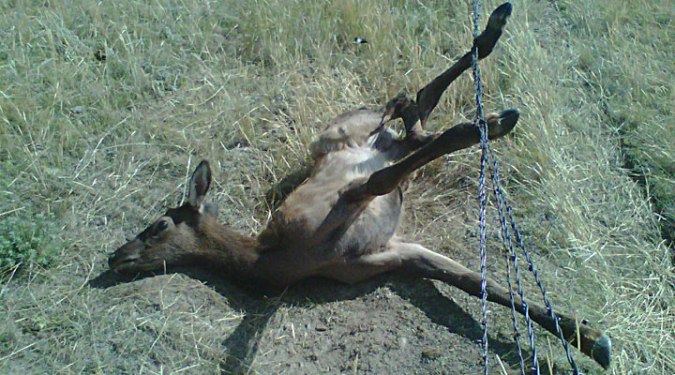by Kenneth Harper Finton ©2015
“Give me land, lots of land with the sunny skies above, Don’t fence me in.” – Cole Porter
Riding in the car on Route 287, the lead elk jumped a fence leaving the others struggling alone on the other side. Fences isolate and entrap while they pretend to protect and defend.
“Good fences make good neighbors,” Robert Frost has said, as though building a wall around yourself is desirable and morally essential.
It brought to mind the day I returned to the country from New York City and took my old dog for a walk in the woods. We came to a fence and I lifted Lassie up over the fence, but she had gained weight and was heavier than I remembered. She struggled free, caught her back leg in the wire and hung there upside down and yelping. I ran off to the nearest neighbor to borrow some wire cutters, but while I was cutting the leg free, the frightened old girl bit me several times. They were painful punctures on the hand that later swelled and ached like a bad tooth.
Until the last one hundred and years life ran free upon the Earth. Then we built the fences and the roads and divided the herds as though we had the inalienable right to do so. After all, are we not the cream of living things, the tamers of nature, the universe itself come to intelligence and great power. Does not ancient and misguided scripture give us power and dominion over all the living things? “Be fruitful and multiply, and fill the earth, and subdue it; and rule over the fish of the sea and over the birds of the sky and over every living thing that moves on the earth.” Genesis 1:27.
Our freeways have separated the species. They are giant fences that imprison and subdue the beasts of the wild and halt their natural evolution. Our fences are created to provide us with a food supply and keep the victims we choose safe for tomorrow’s meals.
Unintended Consequences
Our world is full of unintended consequences. The Scunthorpe problem is named from an attempt to protect people from exposure to the obscene by filtering out strings of letters that spelled what the censors considered to be key strings of letters. As a result, people on Scunthorpe, England could not use the web of look up a local business because the wordcunt was in the town’s name. We can solve our Scunthorpe problems, but it costs money that people would rather use for other things.
Little can be done on the lonely byways where fencing is mandatory and the animals are left to their own devices. Not even Vegan ideas can solve such problems, as wild herds are not used for our primary food supplies. Outdated, obsolete moral codes are responsible for many problems that could easily be solved if only people used reason instead of faith and knowledge instead of dogma.
The prohibition era in the United States was intended to control the liquor traffic and protect the public against alcoholism, but it drove the trade underground and the profits into the hands of mobsters. The same has occurred with the war on drugs.
Abstinence-only sex education has been shown to increase teenage pregnancy rates, rather than reduce them. Compared to either comprehensive sex education or no sex education at all, it has been shown to be ineffective. [Kohler, Pamela; Manhart, Lisa; Lafferty, William (April 2008). “Abstinence-Only and Comprehensive Sex Education and the Initiation of Sexual Activity and Teen Pregnancy”, Journal of Adolescent Health.]
It seems reasonable to require that children be constrained by car seats to prevent injury in case of accidents, but air bags killed many kids. So we decide that moving children to the back seats in rear-facing seats was a solution, but there was a great increase in children being forgotten and left to suffer in overheated cars as a result. Robert K. Merton listed five possible causes of unanticipated consequences in 1996. [Merton, Robert K (1996). “On Social Structure and Science”. The University of Chicago Press.]
- Ignorance, making it impossible to anticipate everything, thereby leading to incomplete analysis
- Errors in analysis of the problem or following habits that worked in the past but may not apply to the current situation
- Immediate interests overriding long-term interests
- Basic values which may require or prohibit certain actions even if the long-term result might be unfavorable (these long-term consequences may eventually cause changes in basic values)
- Self-defeating prophecy, or, the fear of some consequence which drives people to find solutions before the problem occurs, thus the non-occurrence of the problem is not anticipated.
Unintended consequences write the stories of our lives. The world about us is immensely complex. Solving problems create other problems that take their place. The best we can do is be willing to change the basic values that prevent us from creating and maintaining a better world for all.


